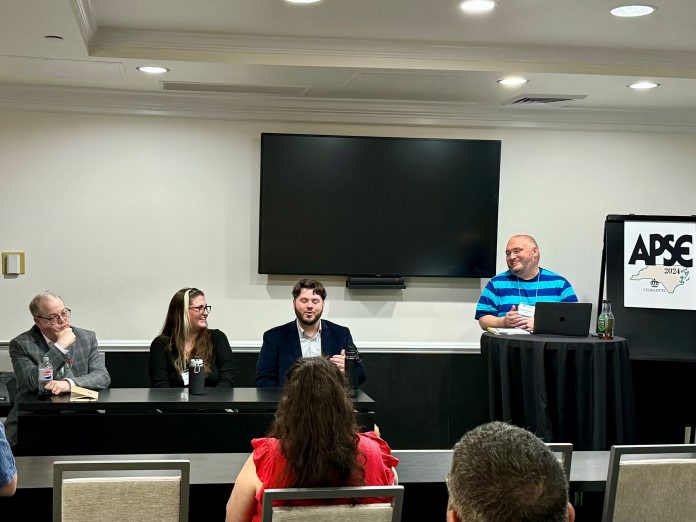
By Derek Harper
The COVID pandemic showed that remote work is possible, but that it doesn’t come without its challenges, especially on the management side of things.
The topic was the subject of a panel discussion Friday during the APSE Summer Conference in Charlotte, N.C. The panel included Evan Gerike, a reporter for the Asheville Citizen Times; Josh Barnett, the managing director for editorial at the Sports Business Journal; and Lauren Jennings, a sports content coach for Gannett’s Center of Community Journalism. The discussion was moderated by Jim Pignatiello, MassLive.com’s deputy editor in charge of sports and audience development.
Communication is key when working remotely, and with that comes the challenge of different communication styles and how people can interpret things. One way to make this easy is to simply ask the reporter their preferred way to communicate. Being able to read body language is important as well, and that comes with being able to see each other.
Gerike touched on the inability to read body language when communication is on a non-visual platform.
“The tone is always so inconsistent with how the actual message may be conveyed,” Gerike said. “I spent a lot of time learning this industry how it is now, which is remote, and how to do that with your editor.”
Gerike said he was asked to fill in on other beats and assignments. With that, he said he didn’t see his editor a lot.
“The tone of what you’re expecting is different until you are able to just talk with them,” Gerike said. “For me, it’s being able to remember that I can call them as long as they can call me.”
It was clear from Gerike that when you’re able to talk to them on the phone or in a video chat, it’s easier to figure out how to cover an event.
He said it’s nice to have that one-on-one discussion. Gerike spoke about how a conversation can be had with his editor and their thoughts on how he’s approaching his story.
It was emphasized from multiple panelists just how important that communication is between editors and reporters.
Barnett said he’ll have some virtual meetings where he tells his staff members it’s a “camera-on” meeting and other meetings where it’s optional.
Building rapport is another key element in working remotely so the relationship between editors and reporters can be strong. This can include discussing items from outside of work such as asking how a reporter’s vacation was so they know you care about them.
Having regular meetings on platforms where you can see others is key to everything working smoothly. This includes editors meeting with the whole staff and one on one with people.
“I set up meetings with everybody one on one every week,” Jennings said.
Along similar lines, Jennings said she’ll have other meetings to discuss any struggles anybody is having, even if it’s just complaining about coaches.
Jennings added that she’ll ask her reporters about what they have planned for the next week.
Barnett also touched on length of conversations by text or email and mentioned his “Rule of seven.” If the conversation is still going after seven texts or emails, he’ll turn it into a call so it can be done easier.




